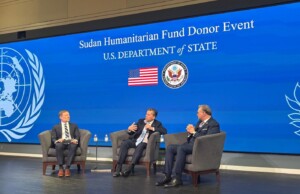Sudan govt, WFP sign memo to combat post-harvest crop loss
Sudan’s Ministry of Agriculture announced the signing of a memorandum of understanding with the UN World Food Programme to find solutions according to a five-year strategy, including measures to provide sealed sacks to contribute to combatting pests and preserving crops.
 A displaced man in Khor Abeche, South Darfur, with a sack of millet distributed by the World Food Programme (File photo: Albert González Farran/Unamid)
A displaced man in Khor Abeche, South Darfur, with a sack of millet distributed by the World Food Programme (File photo: Albert González Farran/Unamid)
Sudan’s Ministry of Agriculture announced the signing of a memorandum of understanding with the UN World Food Programme to find solutions according to a five-year strategy, including measures to provide sealed sacks to contribute to combatting pests and preserving crops.
At a press conference on Wednesday, Minister of Agriculture Eisa Osman pledged to work in building infrastructure, warehouses, and factories, and noted the risks of post-harvest losses to small producers.
Minister Osman pointed out to the role of the private sector in reducing post-harvest losses in cooperation with the public sector through food security, fighting poverty, and achieving the country’s comprehensive agricultural development.
World Food Programme Country Director for Sudan, Hamid Nuru, affirmed that farmers suffer huge losses after the harvest, which exacerbate the food crisis due to the lack of good use of land and water resources.
He said that Sudan loses 800,000 tons of food annually. He described the post-harvest losses as an infernal cycle, especially since about 60-70 per cent of Sudanese work in the agricultural sector.
He explained that sealed sacks reduce harvest losses to zero and that they are safe, effective and inexpensive, enabling the farmers to maintain their production throughout the year.
30 per cent loss
As reported by Radio Dabanga this week, an estimated 30 per cent of all crops harvested in Sudan is lost due to traditional storage, Acting Country Director of the World Food Programme (WFP) in Sudan, Hani Muslimi said.
This equals $1 billion each year.
Muslimi was speaking at a WFP training workshop aimed at reducing post-harvest losses. The WFP supports 4.4 million people in Sudan. It aims to reach 6 million people this year and improve their food security and therefore their economic situation.
Flour ‘leaked’
Last week, Radio Dabanga reported that the Ministry of Industry and Trade in Sudan has announced new measures to control and monitor the distribution of flour. The ministry acknowledges that 25 per cent of the subsidised flour ration – equal to 25,000 sacks a day – are being ‘leaked’.
In a press conference, the Undersecretary of the Ministry of Industry, Mohamed Abdallah warned all bakery owners or agent distributors who may be involved in the trafficking of flour that any agent distributor who fails to distribute the ration given to him will be replaced.
Radio Dabanga’s editorial independence means that we can continue to provide factual updates about political developments to Sudanese and international actors, educate people about how to avoid outbreaks of infectious diseases, and provide a window to the world for those in all corners of Sudan. Support Radio Dabanga for as little as €2.50, the equivalent of a cup of coffee.












 and then
and then